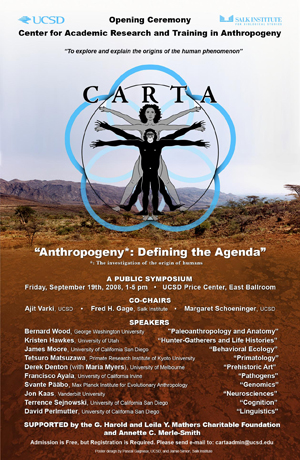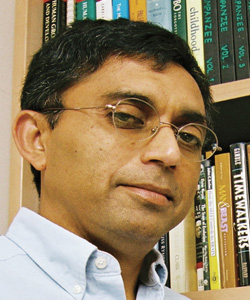New Center for Study of Human Origins Opens in San Diego
UC San Diego and Salk Institute to Present Free, Half-Day Seminar
on the Origin of Humans to Celebrate Grand Opening of Virtual Center
San Diego, Sept. 9, 2008 -- A multidisciplinary group of researchers at the University of California, San Diego, along with colleagues at the Salk Institute for Biological Studies in La Jolla, have established a center to formally explore the origins of humanity and the many facets of what makes us human. To celebrate its opening, the Center for Academic Research and Training in Anthropogeny (CARTA) will present a half-day symposium featuring expert speakers from around the world.
|
The symposium, “Anthropogeny: Defining the Agenda,” which is free and open to the public, will be held on Friday, September 19, from 1 p.m. to 5 p.m. at the Price Center East Ballroom on the UC San Diego campus in La Jolla. (For more information, e-mail cartaadmin@ucsd.edu.)
Among the featured speakers scheduled are UCSD Chancellor Marye Anne Fox; Bernard Wood, Henry R. Luce Professor of Human Origins at George Washington University and a senior scientist at the National Museum of Natural History, the Smithsonian Institution in Washington, D.C.; Tetsuro Matsuzawa, director of the Primate Research Institute of Kyoto University, in Japan; and Svante Pääbo, Director, Max-Planck Institute for Evolutionary Anthropology, Leipzig, Germany. The symposium talks will address subjects ranging from anthropology and prehistoric art to neurosciences and cognition. (Full schedule here.)
CARTA is based on an effort that has already been underway for more than 10 years, coordinated by the UC San Diego Project for Explaining the Origin of Humans (which is the definition of “anthropogeny”). That group, composed of experts from throughout the world, has organized multi-disciplinary meetings and symposia – efforts that will now be converted into a larger and more public research program that will also facilitate graduate and undergraduate education.
The goals of CARTA are essentially scholarly and range from understanding more about human and primate genetics and evolution to advancing relevant knowledge in areas such as language, communication and cognition, human society and culture.
|
“CARTA is ‘transdisciplinary,’ meaning it transcends or goes beyond traditional disciplines, and breaks down the walls between them. In doing so, we are more likely to succeed, by eliminating the concept of individual disciplines, and instead looking at knowledge as a broad-based continuum,” said Varki.
The other CARTA co-directors are Fred H. Gage, Ph.D., professor in the Laboratory of Genetics at the Salk Institute, adjunct professor of neurosciences at UC San Diego, and Margaret Schoeninger, professor of anthropology at UC San Diego. Associate director is Pascal Gagneux, Ph.D., assistant professor of cellular and molecular medicine at UC San Diego and a specialist in human and primate molecular evolution. Support for IT infrastructure and informatics is being provided by the San Diego Supercomputer Center and the California Institute for Telecommunications and Information Technology (Calit2), by John Moreland working with Chaitan Baru, Ph.D. The G. Harold & Leila Y. Mathers Foundation, which has supported the symposia over the past ten years, has committed $3 million to launch the new center. Ms. Annette Merle-Smith of Philadelphia, Pennsylvania is also a major sponsor of the symposia.
Proposed activities of the new center include developing an online museum of comparative anthropogeny; organizing access to resources for great ape research; stewardship of the library, electronic database, serum and skeletal collections donated by the Primate Foundation of Arizona; facilitating a graduate elective course on human origins at UC San Diego as well as the teaching of evolutionary principles at the UCSD School of Medicine; and, development of a peer-reviewed journal, among others.
CARTA leadership also intends to facilitate formation of a graduate faculty that will set up a specialization track in anthropogeny within the next few years.
Related Links
UC San Diego and Salk Institute Establish Center to Study the Origin of Humans 3/4/08
Media Contacts
Debra Kain, UC San Diego, 619-543-6163
Mauricio Minotta,The Salk Institute, 858-453-4100, ext. 1371



